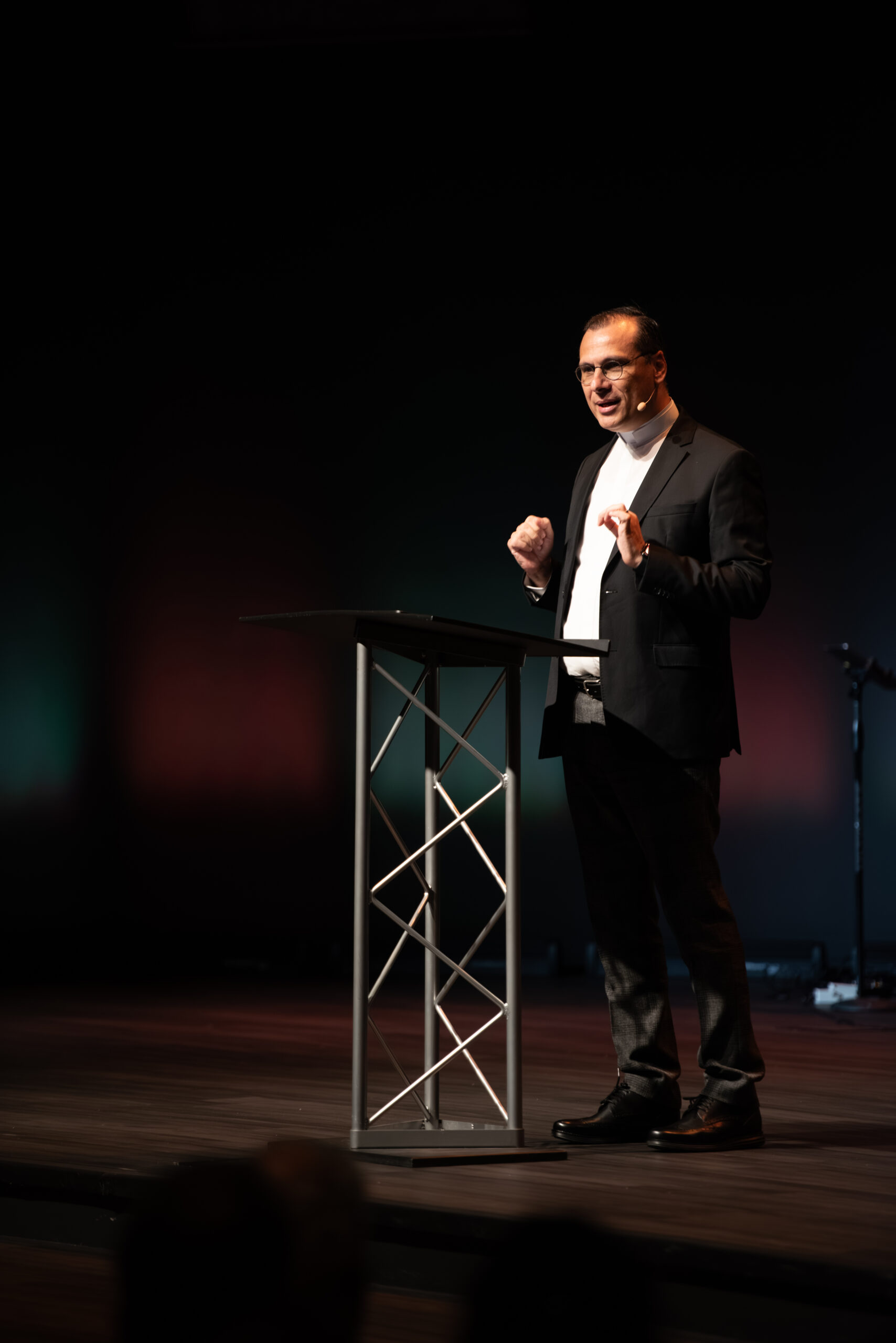Three day gathering culminated in public response to Palestinian Christian letters and commitment to further action.
Glen Ellyn, Illinois — More than 100 Christian leaders, including pastors, theologians, advocates and professors from denominations ranging from Southern Baptist to Episcopal, Presbyterian to nondenominational, added their names to a public response to Palestinian Christians. Over five hundred more have already signed via Change.org following the three-day inaugural Church at the Crossroads conference. Early signatories include individuals like The Reverend Nontombi Naomi Tutu, Dr. Brian Haynes, Dr. Soong-Chan Rah, Rev. Sandra Maria van Opstal, Rev. Adam Russell Taylor, and many others. The conference brought together speakers across traditions and denominations to address current issues of faith and public witness, with a particular focus on the presence of Christians in Palestine. Participants learned from the Palestinian Christian’s experience, engaged in lament, and explored concrete responses on behalf of the global church.
The gathering was convened in response to two public letters issued by Palestinian and Middle East church leaders in October 2023 and August 2024. Both letters urged Western Christians to speak out against the humanitarian crisis in Gaza, examine the theological justifications for violence, and work toward a just peace in the region.
The public declaration, entitled: “Church at the Crossroads: Our Public Response to the Public Calls of Palestinian Christians,” calls on Christians to listen, mourn, repent, affirm convictions rooted in the gospel, and take practical steps toward peacemaking. The declaration includes commitments to re-examine biblical interpretations that justify harm, advocate for a permanent ceasefire, call for the release of all hostages, and support for unrestricted humanitarian aid.
“Our communities have been living with the consequences of war, displacement, siege and apartheid for decades,” said Rev. Munther Isaac, Palestinian pastor and author, who addressed the gathering. “We are aware of the very great disconnect between our reality and the fact that many of our global brothers and sisters in Christ do not even know we exist. In a time when genocide – as reported by numerous independent sources, including Israeli sources – is justified and even supported by churches and while many others were silent, we are here to call them out for repentance. We are asking to be heard, and we believe in Christ that another future is possible: one built on justice, compassion, and peace.”
“This statement is a theological and moral response to the suffering we are witnessing,” said Lisa Sharon Harper, a conference speaker, author and director of freedomroad.us. “Just as we grieved the actions against our brothers and sisters in Israel on October 7, we grieve the ongoing violence crushing our brothers and sisters in Gaza. This declaration is a call to the church to name harm clearly and to align itself with the teachings of Jesus — teachings that give us courage to imagine restoration where there is now devastation.”
Following two days of programming, the conference culminated in an opportunity for attendees to sign the declaration in person on the final day. The conference organizers will make the declaration available for additional signatures, encouraging individuals and congregations to join as the broader American church in solidarity with their Palestinian brothers and sisters.
Original signatories include evangelical pastors, mainline church leaders, scholars, musicians, and Christian advocates. Several are speaking publicly on this issue for the first time, responding directly to what they describe as a “moral emergency” for the church.
“Many in the church have been silent in the face of the atrocities in Gaza,” said Rev. Dr. Mae Elise Cannon, executive director of Churches for Middle East Peace and an early signatory. “We believe the body of Christ must make its position clear: every person, regardless of nationality, bears the image of God and is worthy of life, dignity, and protection. Our hope is that by standing together, we can help open the door to bring an end to all violence and pursue healing for each person who has suffered such profound loss and devastation. The ongoing trauma must be brought to an end before there will ever be peace and hope for a prosperous future for both Palestinians and their Israeli neighbors.”
Dr. Brian Haynes, early signatory and lead pastor of Bay Area Church and Christian School in League City, Texas, added: “As members of Christ’s body, we do not stand apart as spectators to suffering — we share in it. To ignore the wounds of our Israeli friends and our Palestinian brothers and sisters is to ignore the wounds of Christ Himself. Their suffering is our suffering, and their hope is also our hope.”
The Church at the Crossroads conference provided a “menu of action” for participants, suggesting steps such as church-based education initiatives, advocacy campaigns, and partnerships with peacemaking organizations. A companion study guide will be released this fall to help congregations engage the declaration’s themes and scriptural foundations.
Full text of the declaration can be accessed at churchatthecrossroads.com/declaration.
About Church at the Crossroads
Church at the Crossroads is an inaugural gathering of Christians from diverse theological and cultural backgrounds committed to peacemaking, justice, and solidarity with the oppressed. The 2025 conference will bring together speakers from across traditions to address urgent issues of faith and public witness — with the conviction that the way of Jesus offers both a truthful reckoning with injustice and a hopeful vision for reconciliation.
For more information, visit churchatthecrossroads.com.


No responses yet